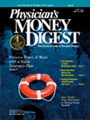Publication
Article
Think Positive Thoughts About This Era
Author(s):
The war on terror, global warming, corporatefraud, rising health care costs, poverty, traffic jams—it seems there's a lot to complainabout today. And Westerners, Americans inparticular, have gotten good at it. Think about yourown conversations. Isn't it far more common to talkwith someone about how bad things are than howgood they are? It has led our society to a fairly acceptedassumption that life was better in the past. Manyof today's seasoned practicing physicians also believethis to be true.
The ProgressParadox: How Life Gets Better While People FeelWorse
But was it really better? Not according to the latestbook from Gregg Easterbrook, MSJ. In stark contrastto today's rampant negativism, (Random House; 2003) is chock full of wide-rangingstatistics and research that make the persuasiveassertion that almost all aspects of Western lifehave vastly improved in the past century.
The New Republic
Yet, despite this, most people feel less happy thanin previous generations. Easterbrook, a senior editorof and a visiting fellow in economicsat the Brookings Institution (www.brook.edu),delves into why this dynamic exists today and whatpeople can do about it.
Better Than Ever
When you focus on the positive aspects ofAmerican life today, Easterbrook's arguments resonate.Just some of the many statistics and perspectiveshe offers include:
• Roughly 100 years ago—The average life spanwas 41 years; now it's 77 years. Less than 20% ofAmericans owned their home; today almost 70% do.The typical workweek was 53 hours; today it's 42.
• By the 1950s—It took 16 weeks of labor forevery 100 square feet of home purchased; now it's just14 weeks. A McDonald's cheeseburger cost 30 minutes'worth of wages; today it's 3 minutes' worth.Owning two cars was a wished-for ideal; today, athird of families own three cars or more.
In general, we shrug off diseases our grandparentsdied from; our houses are larger with more amenities;roughly 13% of home purchases are second homes;and in 2001, we spent more than the gross domesticproduct of North Korea on recreational watercraft.Not only is the individual doing fairly well, but alsocrime is down, the environment is cleaner, and peopleare more educated. Easterbrook writes, "For essentiallyall of human history until the last few generations,the typical person's lot has been unceasing toil,meager living circumstances, uncertainty about food,rudimentary health care, limited education, little travelor entertainment; all followed by early death."
He later continues, "Only by the 1970s did livingstandards, life expectancy, health care, education, andpersonal freedom begin to approximate today's. Andno one would choose to time travel to the 1970sbecause you'd have to wear the clothes."
Half-Empty Glass
Despite all this, the percentage of Americansdescribing themselves as happy has not moved a notchin half a century. During that same time, unipolardepression became 10 times more prevalent. Easterbrookpoints to a number of causes:
• Collapse anxiety—This is a fear that good timescannot last and inevitably will collapse. And this feelingmay be supported by natural selection. Easterbrookwrites, "Perhaps our uneasy and anxious progenitors,the ones who never really relaxed or felt comfortable,were more likely to survive, while our smiling, flowersniffingforebears got eaten by something."
• The tyranny of the small picture—Fed by a toooftenmyopic media, we focus more on the "lessernegative within the greater positive." This is especiallytrue in the area of medical care. Despite incrediblemedical advances, the coinciding rise in health carecosts causes constant grumbling. Easterbrook dedicatesmany pages to this dynamic and makes a tellingpoint with one example: In 2001, 200,000 kneereplacements were performed in the United States—atreatment that did not exist a generation ago.Progress? Yes. But the total cost? Health care spendingto the tune of $52 billion is health care spendingthat also did not exist a generation ago.
• Catalog-induced anxiety—Today we can readmagazines and watch TV programs that showcase thelives of the rich in great detail. Or we can simply pick upa catalog of overpriced luxuries that we cannot afford.
Still other factors contribute to a pessimistic outlook,such as the efforts of fundraisers and the media'spenchant for headline-amplified anxiety.
Ultimately, however, Easterbrook points to thefact that we have a need for material things, yet wealso have a need for meaning. Material things aremore easily gained—it is the latter that is often elusive.
Possible Solutions
Detailing the emerging science of positive psychology,which seeks to understand what causes aperson's sense of well-being, Easterbrook offers analternative to our culture of crisis and complaint.And it's one that would make your mother proud.He makes a compelling case that optimism, gratitude,and acts of forgiveness not only make modernlife more fulfilling, but also are actually in our self-interest.But he also admits that this is essentiallymuch easier said than done.
And in case you think Easterbrook's case for optimismignores societal ills, it doesn't. Easterbrookexamines many of the topics listed in the first line ofthis article—especially poverty. He calls for universalhealth insurance as well as a real "living" minimumwage. He also focuses a sharp eye on some of theabsurdities of wealth today, while criticizing many topCEOs who have lived ostentatiously at the greatexpense of others.
Ultimately, the message that readers take away isaffirming. Yes, we still do have problems of poverty,pollution, etc, but with so many doing so well, wehave a better ability to solve them as never before.And if we dedicate ourselves to societal solutions, wegive our lives new meaning—which only makes ushappier individuals in the end.
As Easterbrook writes, "…if the Western worldhas known a Golden Age, it is right here, right now."To obtain more information, visit www.greggeasterbrook.com.
